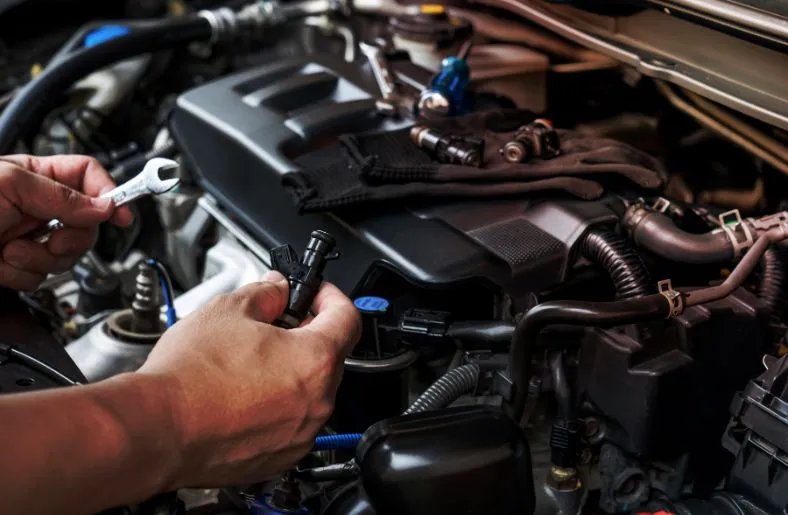Fuel injectors play a crucial role in the modern internal combustion engine, delivering the right amount of fuel into the combustion chamber at precisely the right time. Proper maintenance of these essential components is vital for optimal engine performance and fuel efficiency. One often overlooked aspect of fuel injector maintenance is lubrication.
In this comprehensive guide, we will explore the importance of lubricating fuel injectors and provide step-by-step instructions on how to lubricate fuel injectors effectively.
Table of Contents
Fuel Injectors and Their Importance
Fuel injectors are precision-engineered components that atomize fuel and spray it directly into the combustion chamber. This precise delivery of fuel is essential for efficient combustion, power generation, and minimizing emissions.
Over time, fuel injectors can become clogged or develop deposits, leading to poor performance, decreased fuel efficiency, and engine problems.
The Role of Lubrication in Fuel Injector Maintenance
Lubrication is a key aspect of fuel injector maintenance. It helps prevent corrosion, reduces friction within the injector, and keeps the components working smoothly. Proper lubrication can also help extend the life of the fuel injectors and improve their overall performance.
When to Lubricate Fuel Injectors
Before we dive into the process of lubricating fuel injectors, it’s important to understand when this maintenance task should be performed. Here are some signs that indicate it’s time to lubricate your fuel injectors:
- Reduced Fuel Efficiency: If you notice a sudden drop in your vehicle’s fuel efficiency, it may be due to clogged or inefficient fuel injectors that need lubrication.
- Rough Idling: A rough or erratic idle is often a symptom of fuel injector issues. Lubrication can help smooth out the engine’s idle.
- Engine Misfires: Misfires can occur when fuel injectors are not delivering fuel consistently. Lubrication can help resolve this issue.
- Increased Emissions: A malfunctioning fuel injector can lead to increased emissions. Regular lubrication can help maintain optimal combustion and reduce emissions.
How to Lubricate Fuel Injectors
Materials and Tools Required
Before you follow the guide on how to lubricate fuel injectors, gather the necessary materials and tools:
- Fuel Injector Cleaner: A high-quality fuel injector cleaner will help clean and lubricate the injectors. Make sure to choose a cleaner compatible with your vehicle’s fuel system.
- Safety Gear: Wear safety goggles and gloves to protect your eyes and hands from any splashes or fumes.
- Fuel Pressure Gauge: This tool helps you measure the pressure in the fuel system, ensuring it’s within the recommended range.
- Socket and Ratchet Set: You may need to remove components to access the fuel injectors. A socket and ratchet set will be handy for this purpose.
- Fuel Injector O-rings: Depending on your vehicle’s make and model, you may need replacement O-rings for the fuel injectors.
How to Lubricate Fuel Injectors: Step-by-Step Guide
Here are the steps that are the part of “How to lubricate fuel injectors” guide:
Step 1: Safety First
Ensure your vehicle is parked in a well-ventilated area, and you’re wearing appropriate safety gear.
Step 2: Locate the Fuel Injectors
Depending on your vehicle’s design, you may need to remove some components to access the fuel injectors. Consult your vehicle’s repair manual for guidance on this.
Step 3: Check Fuel Pressure
Use a fuel pressure gauge to measure the pressure in the fuel system. The pressure should be within the manufacturer’s recommended range.
Step 4: Disconnect the Fuel Injector
Carefully disconnect the electrical connectors to the fuel injectors. This step may vary depending on your vehicle, so consult your repair manual for specific instructions.
Step 5: Add Fuel Injector Cleaner
With the fuel injectors accessible, add the recommended amount of fuel injector cleaner into the fuel rail or the fuel injector’s intake.
Step 6: Run the Engine
Start the engine and let it run for a few minutes. The cleaner will flow through the fuel system, cleaning and lubricating the fuel injectors.
Step 7: Reconnect Fuel Injectors
After running the engine, reconnect the electrical connectors to the fuel injectors.
Step 8: Test Drive
Take your vehicle for a test drive to ensure the fuel injectors are functioning properly. You should notice improved performance and smoother operation.
Step 9: Monitor Fuel Efficiency and Performance
Over the next few weeks, keep an eye on your vehicle’s fuel efficiency and overall performance. Lubricating the fuel injectors should lead to noticeable improvements.
Related Guide: Can You Mix High Mileage Oil with Regular Oil? What You Need to Know (2023-2024)
FAQs
1. How can I make my fuel injectors last longer?
Regular maintenance is the best way to ensure that your fuel injectors will last as long as possible. This includes: Changing the oil regularly: Your car’s oil should be changed according to the manufacturer’s recommended schedule to keep the engine and other parts running smoothly.
2. What destroys fuel injectors?
While many things can cause breakdowns, the most likely cause of premature failure is fuel contamination. Fuel contamination occurs when debris in the fuel gets past the filtration, destroying the sealing surfaces. Think microns, smaller than a human’s hair-sized, clearances.
3. What chemical is used to clean fuel injectors?
Look for cleaners that contain Polyetheramine (PEA) or Polyisobutene (PIB). These chemicals are known for their excellent cleaning properties, specifically designed to break down and remove carbon deposits, varnish, and other contaminants within fuel injectors efficiently.
Conclusion
Properly lubricating your fuel injectors is a crucial part of routine maintenance that can have a significant impact on your vehicle’s performance and longevity. By following the steps on how to lubricate fuel injectors, you can keep your fuel injectors clean and well-lubricated, ensuring they continue to deliver fuel accurately and efficiently.
Regular maintenance and attention to your vehicle’s fuel system will not only save you money on fuel but also contribute to a smoother and more reliable driving experience.

